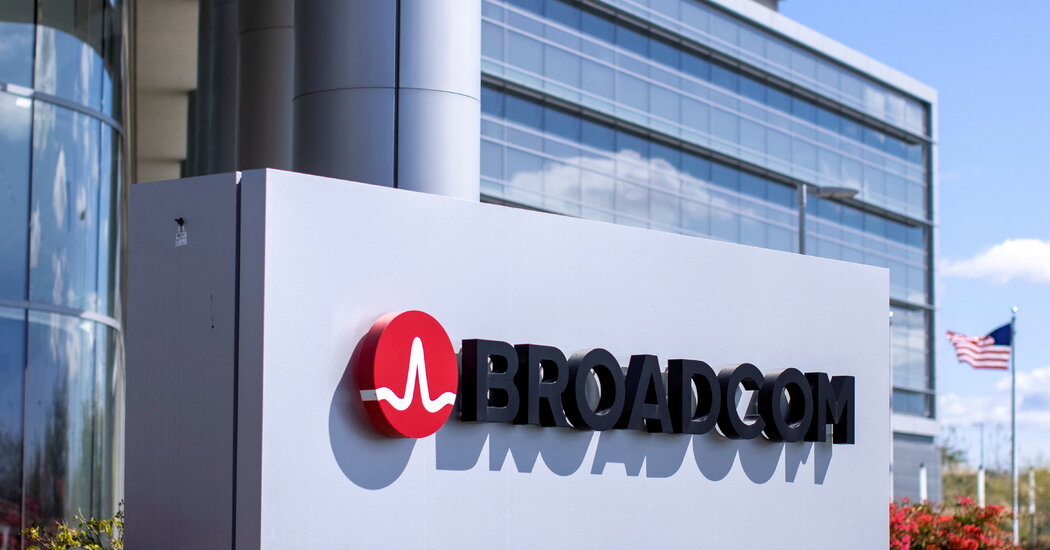Broadcom, the semiconductor giant, said Thursday it had agreed to purchase software company VMware in a $61 billion transaction that would realign the massive enterprise computing technology market.
The deal, which would provide Broadcom with popular computing tools used by a large number of companies, would be the second-largest acquisition this year, according to data from Dealogic, following Microsoft’s $75 billion bid for video game company Activision Blizzard.
While the combination would make Broadcom a major player in data center technology and cloud computing, it’s hardly an amalgamation of household names, much like Elon Musk’s high-profile pursuit of Twitter. However, it reminds us that tens of billions of dollars are spent every year on mergers between the many companies that make the technologies that power the Internet and large corporate computer networks.
The Broadcom deal is the latest in a series of ownership changes for VMware, a pioneering software company that helped create some of the key technologies now widely used in cloud computing. VMware has more than 500,000 customers worldwide and partners with all major cloud providers, including Amazon, Microsoft and Google.
That makes VMware a valued asset to Broadcom’s chief executive, Hock E. Tan. Broadcom will spend the equivalent of $138.23 per share for VMware in the cash-and-stock deal, it said in a statement. That’s more than 40 percent higher than VMware’s stock price before deal rumors circulated last weekend.
VMware “provides plumbing for most of the world,” Dennis Smith, an analyst at Gartner, said in an interview. VMware’s software helps manage more business information than the combined public clouds of Amazon, Microsoft and Google — all of which have struggled to bring more of that data to their services, Mr. Smith said.
Mr. Tan had been one of the most greedy forces in the chip industry, forging Broadcom one deal at a time, until President Donald J. Trump blocked Broadcom’s proposed $117 billion acquisition of chipmaker Qualcomm in March 2018 on national security grounds. Broadcom, which was based in Singapore at the time, has relocated its headquarters to San Jose, California.
Since then, Mr. Tan diversified his goals. He later bought the software company CA Technologies for $18.9 billion in 2018 and a security division from Symantec for $10.7 billion in 2019.
In those deals, Mr. Tan established companies that are essential to companies’ computing infrastructure. CA had started providing software for mainframe computers decades earlier and had moved over the years to a range of products as Symantec made a name for itself as a leader in cybersecurity tools.
Under the agreement, CA and Symantec will become part of VMware, the new name of Broadcom’s software division. Whether Broadcom will give VMware autonomy in making decisions is “the $61 billion question,” said Mr. Smith.
Broadcom said it would fund the deal with $32 billion in debt from numerous banks. The company said it plans to reduce its debt “soon” after the transaction. The chipmaker followed a similar pattern in its recent software transactions, binge eating and then digesting by prioritizing debt repayment.
With its so-called virtualization software, which allows one computer to behave like many machines and essentially make computing more efficient, VMware would be Broadcom’s flagship product. VMware strengthened the role of software in data centers and redesigned the way organizations manage their industrial computers. The concepts behind VMware’s technology were the foundation for cloud computing, which relies on virtualization.
VMware reported revenue of $12.9 billion in its last fiscal year, which ended January 28. That was an increase of 9 percent from the previous year. That growth rate was much slower than the cloud computing arms of Amazon, Microsoft and Google. Founded in 1998, before the rise of the cloud, VMware relied on customers still operating their own data centers.
The deal is the latest in a series of major changes for VMware. The company, based in Palo Alto, California, lost its longtime chief executive, Pat Gelsinger, to Intel in January 2021. On May 12, it gained a new chief executive, Raghu Raghuram, and lost a chief operating officer, Sanjay Poonen, on the same day. In November, the software maker became independent when it was spun off from Dell Technologies.
Under Mr. Gelsinger, VMware was eager to break away from the personal computer maker who owned a majority of its shares. Dell acquired the stake through the acquisition of EMC, VMware’s previous majority shareholder. VMware saw independence as a strategic advantage, allowing it to forge new alliances with a variety of technology vendors. It also believed that Wall Street would reward it with a higher share price if it split from Dell.
Instead, the company’s shares fell 19 percent from the start of the year to Friday, the last trading day before Bloomberg reported on negotiations with Broadcom.
Brad Zelnick, an analyst at Deutsche Bank, said VMware had lost its luster with public investors as it struggled to compete with newer cloud technology.
“They have been challenged as a company to adapt to this transition,” said Mr. Zelnick.
That stock drop made VMware a more attractive target for Mr. Tan and possibly other suitors. If shareholders and regulators approve the deal, VMware’s long-desired independence will come to an end.
The terms of the deal with Broadcom include a “go-shop” period, which gives VMware management 40 days to seek a better offer from another buyer. The VMware acquisition could make sense for several other technology companies, including IBM and Intel.

